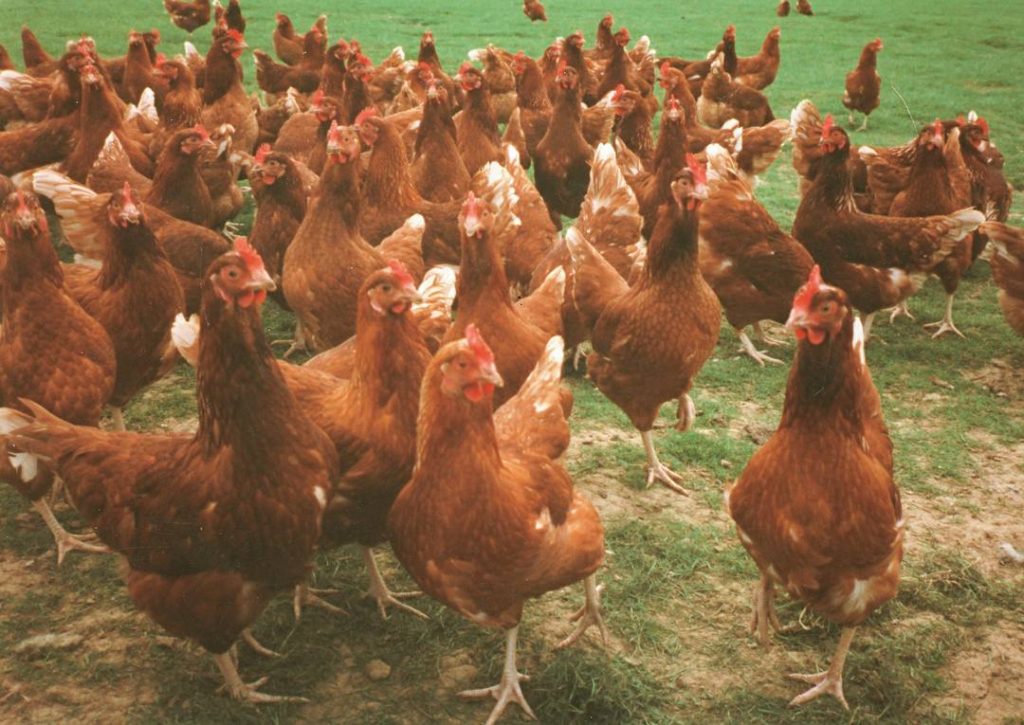
Recently we’ve seen a new class of eggs appearing on the market, Eggs from Pasture Fed Hens. We look at pasture feeding in comparison to other methods of egg production and the quality and nutritional quality of the eggs.
Caged Versus Free-Ranged Hens Feeding
Hens kept in cages or sheds will have been fed exclusively on commercial compound feeds. These feeds are formulated to provide the optimum levels of protein and carbohydrates etc. to keep the hens in good condition and producing eggs to the best of the bird’s ability.
Due to public pressure most of the large supermarkets are now phasing out eggs from caged hens. However, huge numbers of these eggs are still produced for the food industry.
Free-range hens are allowed access to range during the day. They can, in theory, supplement their diet of provided compound feeds with grass and fodder from pasture. In practice many of the hens never actually leave the poultry house which may house as many as 16,000 birds.
Many of the hens that actually make it out of the house do not venture far, so the area immediately outside just becomes bare soil or mud in wet weather whilst the pasture further away remains undisturbed.
The free-range hens are basically eating the same compound feeds as caged birds and nutritionally there is little if any difference between free-range and caged bird’s eggs.
Pasture Fed Hens
Pasture fed hens need more land per bird and smaller scale housing so that the birds will leave the house and forage in the day. Often the houses are mobile so the land can be rested and rotated.
The hens may be kept alone on the land or they may share the pasture with sheep or cattle who will graze off the longer grasses that are unpalatable to fowl and may cause problems with impacted crops.
Ideally the pasture will have been sown with a specific poultry mix to maximise the available nutrition and attract insects etc. that the birds can eat.
Problem with Pasture Feeding Chickens
There is a problem with pasture feeding. Because modern breeds lay so many eggs, they require high quality, calorie dense feed. The hen’s systems can only handle a set amount of food so if that food isn’t rich enough the birds’ condition will deteriorate.
Trials in the USA of birds kept on pasture feeding hens versus birds kept caged and fed on compound feed showed the pastured hens produced 15% less eggs and weighed 14% less at the end of the trial. This was despite the diet of the pasture fed birds being supplemented with commercial hen mash at 70 g per bird per day.
Types of Poultry Pasture
The trial used 3 types of pasture; alfalfa, red & white clover and mixed grasses.
Comparing Pasture Fed with Caged Eggs
Comparing pasture fed birds’ eggs with caged showed the following. The pasture fed birds produced eggs with double the vitamin E and over double the omega 3 with a higher concentration of vitamin A.The analysis of the eggs showed the grass fed bird’s eggs had 23% more vitamin E than clover fed bird’s eggs.
It’s clear from the trial that eggs from pasture fed hens are better for our health containing more vitamins and omega 3 but exactly how much better will depend on the type of pasture.
Ideal Methods for Pasture Feeding Hens and Eggs
The ideal, from a welfare and egg quality perspective, would appear that the birds be kept on a purpose formulated, mixed pasture and their diet supplemented with a compound feed to maintain their condition by supplying their energy and protein needs.
Trial – see: H.D. Karsten, P.H. Patterson, R. Stout and G. Crews (2010). Vitamins A, E and fatty acid composition of the eggs of caged hens and pastured hens. Renewable Agriculture and Food Systems, 25, pp 45-54. doi:10.1017/S1742170509990214.
More on Feeding Chickens
- Best Grass Seed Mix for Chickens – Poultry Pasture Seed Mix
- Feed Your Back Garden Chickens More Greens
- Feeding Chickens – Nutritional Requirements & Sources
- Feeding Chickens Eggshells, Crushed Oyster Shell & Grit
- Feeding Chickens from Chicks to Laying Hens for Backgarden Keepers
- Feeding Chickens on Food Scraps and Waste Food
- Growing & Feeding Sprouted Wheatgrass Fodder to Hens
- Herbs For Hens – A Useful Dietary Supplement
- Pasture Feeding Hens for Better Eggs
- Why we should avoid Soya in Animal & Poultry Feed

